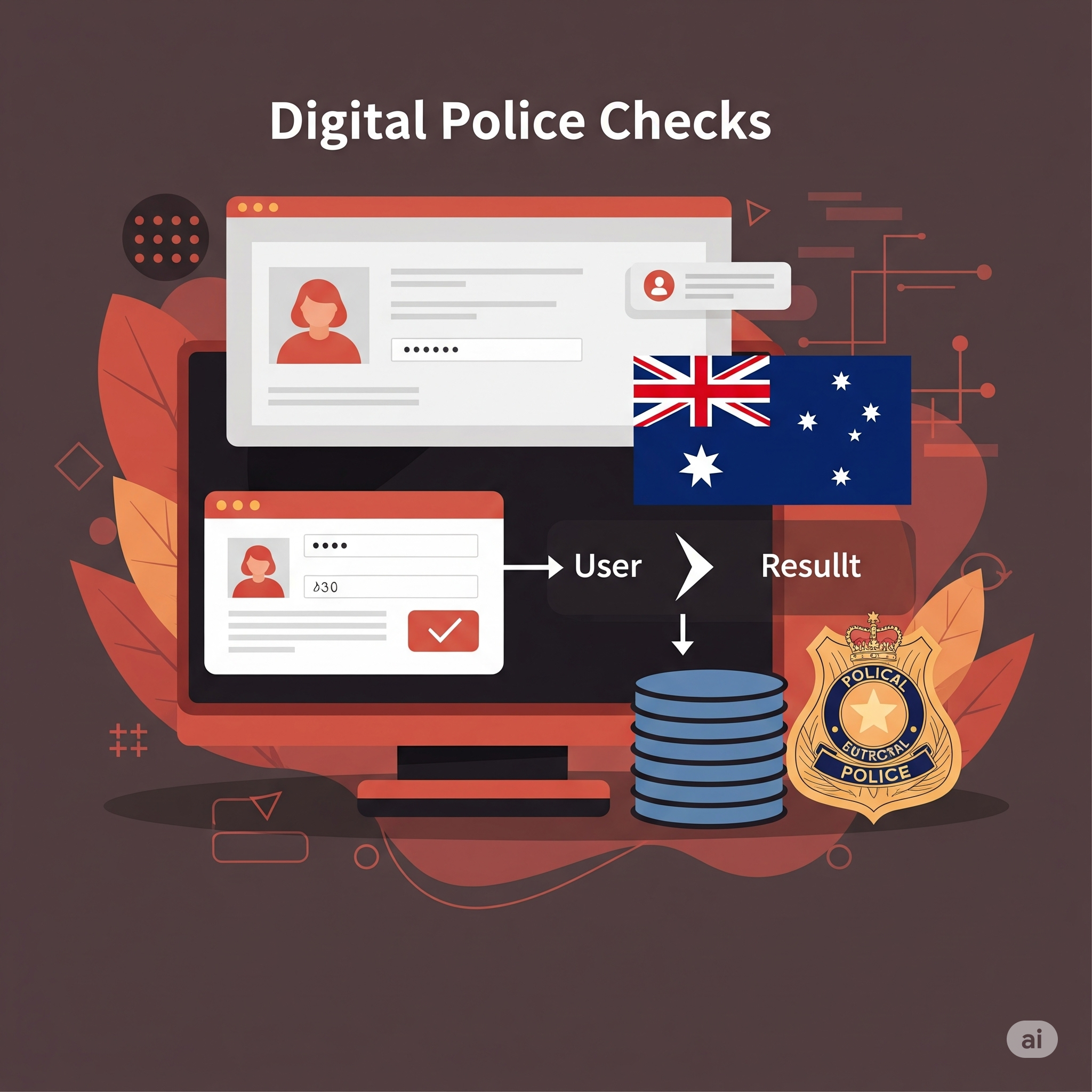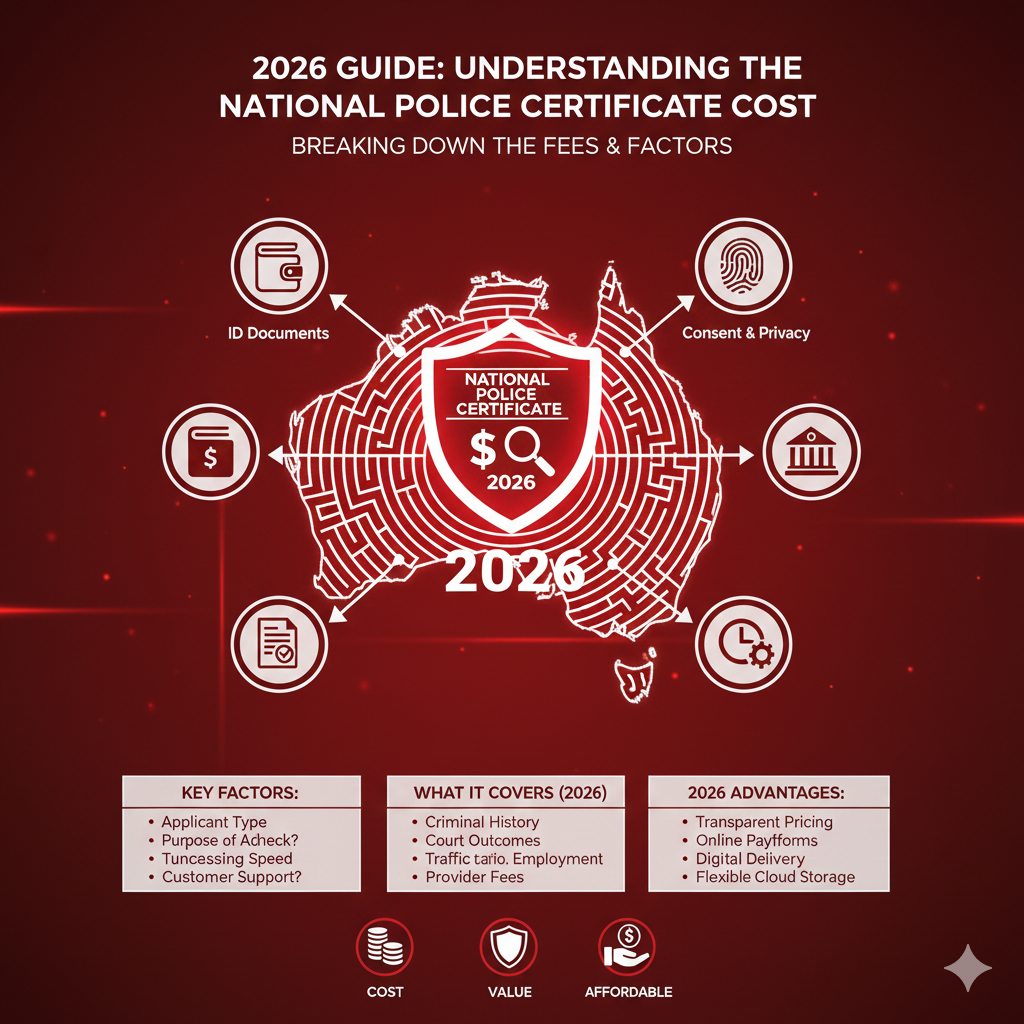The world is rapidly embracing digital solutions, and Australian criminal screening procedures are no exception. With an increasing demand for faster, more dependable, and secure background checks, digital police checks are swiftly becoming the new standard for corporations, government agencies, and individuals.
This guide explores how the police check landscape in Australia is shifting, what digital transformation means for users and providers, and what lies ahead for the background screening industry.
What Are Digital Police Checks?
In Australia, digital police checks involve the online and computerized handling of criminal history records. Unlike past approaches, which relied heavily on paperwork and manual verification, the digital procedure allows faster processing times, secure online submissions, and continuous monitoring.
Key features of digital police checks include:
- Online identification verification with government databases.
- Uploading documents safely with secure cloud storage.
- Integration of national police data.
- Results delivered digitally via secure portals and email.
Digital police checks have become a cornerstone of efficient, tech-driven hiring processes. They offer a scalable, future-ready solution for background screening, supporting everything from one-off checks to enterprise-level screening programs.
The adoption of digital police checks has streamlined the background screening process, making it more accessible and efficient across industries.
Why Are Digital Police Checks Gaining Popularity?
There is an increasing demand for real-time hiring, quick onboarding, and improved workplace security. Digital police checks meet all of these requirements while adhering to national and state rules.
Major reasons for the move to online police checks:
- Speed: Weeks-long turnaround times shortened to hours or days.
- Convenience: The entire procedure can be completed remotely.
- Security: Sensitive data protected by encryption and safe handling.
- Scalability: Perfect for bulk checks in large organisations.
- Accessibility: Easier access for rural or remote applicants.
Additionally, digital checks align with evolving workforce expectations. Today’s professionals seek flexible, digital-first onboarding experiences, and organisations that implement modern police checks send a strong signal about innovation and compliance.
How Do Digital Police Checks Operate?
Obtaining a digital police check is a straightforward and user-friendly process. For most authorised digital screening services, a typical workflow looks like this:
Step-by-step Process
- Internet-Based Application
Candidates give consent and fill out personal details using a digital form. - Identity Verification
Digital services compare submitted information with government records using secure APIs. - Uploading Documents
Users upload ID documents such as a passport or driver’s licence via a secure portal. - Submission to National Database
The check is forwarded to the National Police Checking Service (NPCS). - Results Delivery
Most checks are processed and returned digitally within one or two business days.
Thanks to automation and system integration, each step is faster, more secure, and less prone to human error than traditional paper-based methods. This modern workflow ensures compliance with Australian regulatory standards while saving time.
Benefits of Digital Police Checks for Employers
Employers in a number of industries including government, healthcare, construction, and education are using digital police checks to accelerate recruitment and ensure legal compliance.
Key Benefits for Employers
- Faster hiring decisions and shorter onboarding periods
- Bulk screening capability for high-volume recruitment
- Automated notifications for rescreening or expiring checks
- Improved audit trails and digital documentation
- Role-specific screening tailored to regulatory needs
Digital police checks are also easy to integrate with HR systems, giving applicants a seamless application and verification procedure. Employers can keep monitoring with integrated dashboards to guarantee a smooth and transparent hiring process.
Digital police checks provide a major competitive advantage in job marketplaces because of their reliability and quickness.
Government and Regulatory Support for Digital Screening
Recognising the benefits of digitisation across both public and private sectors, Australian government agencies have actively supported the transition to digital police screening.
The National Police Checking Service (NPCS), managed by the Australian Criminal Intelligence Commission (ACIC), oversees the framework that supports digital police checks.
Government investments include:
- API-driven verification frameworks
- Digital ID initiatives like myGovID
- Cybersecurity programs to protect police check data
These actions ensure continued compliance with national data protection laws, like the Australian Privacy Principles (APPs), and provide speedier assessments. The goal is to create a safer, smarter system that encourages economic mobility and self-assurance in one’s digital identity.
Digital Police Checks in Different Sectors
Digital police checks are already transforming multiple sectors in Australia. Their adoption continues to expand as more industries digitise hiring and compliance.
Key Sectors Benefiting from Digital Police Checks
- Healthcare: Nurses, aged care workers, and allied health professionals
- Education: Teachers, childcare staff, and school volunteers
- Construction: Workers requiring compliance with industry regulations
- NDIS: Support workers and registered providers for disability services
- Government: Civil servants and contractors requiring national clearance
The retail sector, logistics, and financial services sectors are increasingly using digital police checks to uphold employee confidence and enforce security protocols.
Challenges in the Transition to Digital Checks
Despite numerous advantages, the shift to digital screening isn’t without challenges.
Potential Hurdles
- Digital literacy gaps, especially among older applicants
- Stronger cybersecurity measures required to mitigate digital threats
- Compatibility with legacy HR systems
- Compliance with evolving privacy laws (APPs)
- Clarity in digital identity laws and responsibilities
Suppliers have invested in cyber defense systems, clarifying instructions, and constantly enhancing user interfaces in order to circumvent these issues. Another advantage of federal attempts at standardization is that they assist in helping to clarify expectations about digital verification.
The Role of Accredited Providers Like Rapid Screening
To ensure secure and legally compliant checks, organisations must work with providers accredited by the ACIC. One such provider is Rapid Screening, which offers:
- ACIC-authorised national background checks
- Fast turnaround times
- Intuitive, mobile-friendly digital platforms
- Bulk screening for businesses and institutions
- Audit-ready reporting tools
Alongside extra pre-employment solutions like reference checks and talent evaluations, Rapid Screening delivers a one-stop shop for legal hiring.
Businesses may profit fully through digital transformation without jeopardizing security or compliance by working with an experienced vendor.
What’s Next for Digital Police Checks in Australia?
As digital infrastructure develops, police inspections are anticipated to become much more inventive. In addition to being faster, future computerized police inspections will also be more advanced and flexible.
Since blockchain technology may provide immutable record-keeping, increasing transparency and decreasing the possibility of data manipulation, research into its integration is essential. AI-powered risk assessment systems in the future will also be able to analyze check findings more quickly, spot trends, and highlight possible issues more quickly than manual checks.
Furthermore, biometric verification is expected to enhance or perhaps replace conventional identification techniques, resulting in a faster and more accurate process. Real-time monitoring technology may soon make it possible to do continuous background checks for positions that need constant supervision, including those in childcare, healthcare, or finance. This would enable businesses to take a preventive approach to risk.
Lastly, compatibility with international digital screening will be essential when international workforces become more mobile. Future technologies should make cross-border police checks smooth, enabling worldwide hiring without the typical hiccups and irregularities.
Tips for Making the Most of Digital Police Checks
For businesses and individuals looking to maximize the benefits of digital screening, a few crucial strategies can make all the difference. You must explicitly standardise digital police checks to guarantee consistency and compliance throughout your hiring and onboarding processes. Setting up automated reminders for re-screening cycles can help organisations remain ahead of expiration checks, especially for jobs that require frequent revisions.
Sensitive information is always protected when trustworthy platforms that provide secure identity verification are chosen. Training staff members on digital privacy protocols and data handling best practices is also essential to ensure that everyone involved in the screening process understands their roles. Last but not least, make the time to review and enhance your screening procedure on a regular basis to make sure it still complies with the most recent industry and legal requirements.
Organizations should set up distinct processes to deal with highlighted results, such as escalation procedures and compliance checks. Additionally, incorporating your HR software stack with your digital screening equipment may significantly enhance process efficiency.
Conclusion
Numerous facets of Australian life, such as banking and healthcare, have already been altered by the digital revolution. Right now, it’s changing the way we conduct police checks. For contemporary businesses, digital police checks are a more logical and responsive option due to their quicker return times, enhanced security, and national-level compliance. For modern enterprises, digital police checks will become not only beneficial but also essential as the demand for secure, real-time background checks continues to rise.
Frequently Asked Questions (FAQs)
Q) What is a digital police check?
A digital police check is a secure online background check process that verifies a person’s criminal past by using national police databases. Uploading documents, verifying identity, and transmitting results through secure digital channels are all part of the process.
Q) Does Australia have a law that allows digital police checks?
Yes. Rapid Screening along with other ACIC-accredited services conduct digital police checks, which are entirely legal and compliant with Australian regulations and laws.
Q) How long does it take for a result from a digital police check?
Most digital police checks are completed and returned within one to two business days, depending on the complexity of the applicant’s criminal record and the volume of applications being processed.
Q) Will my data be secure during a digital police check?
Obviously. Accredited providers make sure your data is protected at every stage by using secure cloud storage, encrypted communications, and adherence to the Australian Privacy Principles (APPs).
Q) Who can apply for a digital police check?
Job applicants, employers, volunteers, and applicants for visas may apply through a digital police check through a registered agency. Government employees, healthcare professionals, and educators particularly benefit from it.




